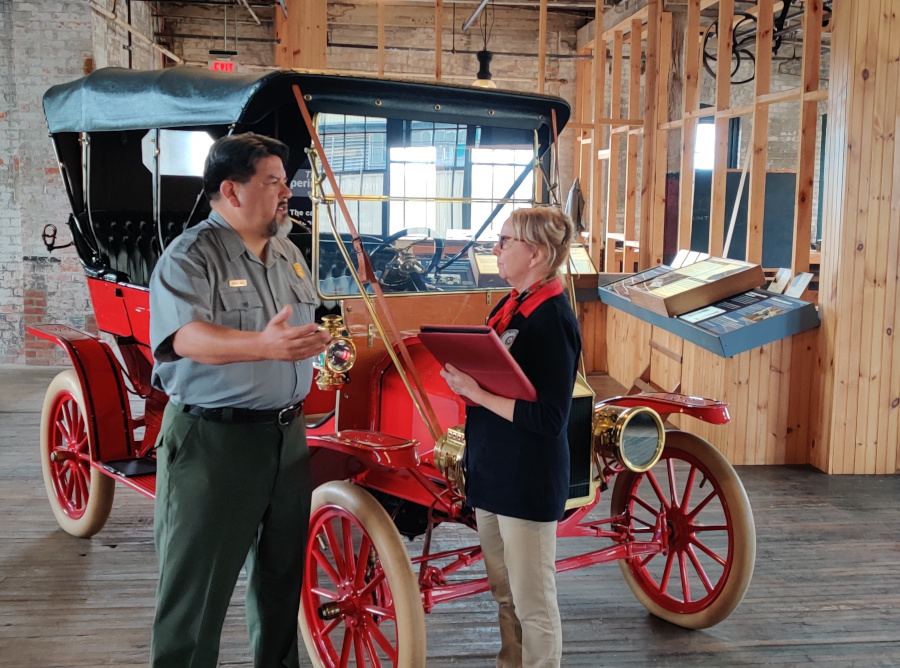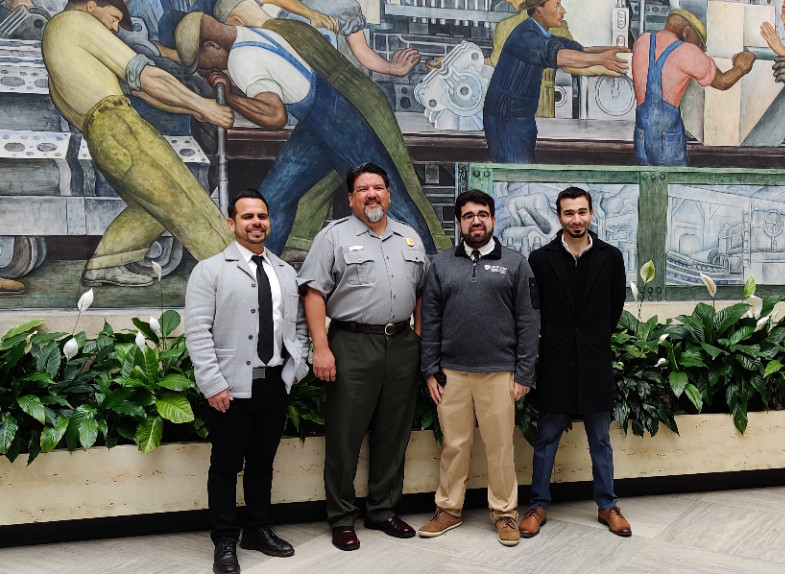
MotorCities National Heritage Area, with funding from the National Park Foundation, is collecting and archiving unique personal stories of the people, places, and spaces that put the world on wheels through oral history interviews.
Now, as we celebrate 250 years of our nation's history, you can add your own stories using your own device through the interactive platform below!

Become an organizational member today using our secure online system. You become a part of MotorCities, as well as a part of the National Heritage Area System of the National Park Service. We value your membership and thank you for your support!
Your 2026 Organizational Membership entitles you to...
1. Promotion of your organization and its events via our growing ...
Social media portals (over 31,000 daily reach between Facebook, X, Instagram, LinkedIn and YouTube)
Weekly E-Newsletter called "You 'Auto' Know" that reaches more than 5,000 email inboxes every Wednesday
MotorCities.org website (pageviews have quadrupled over the last five years)
2. The ability to apply for Challenge grants to support your revitalization, education, or heritage tourism programs. Learn more here.
3. MotorCities Membership Card
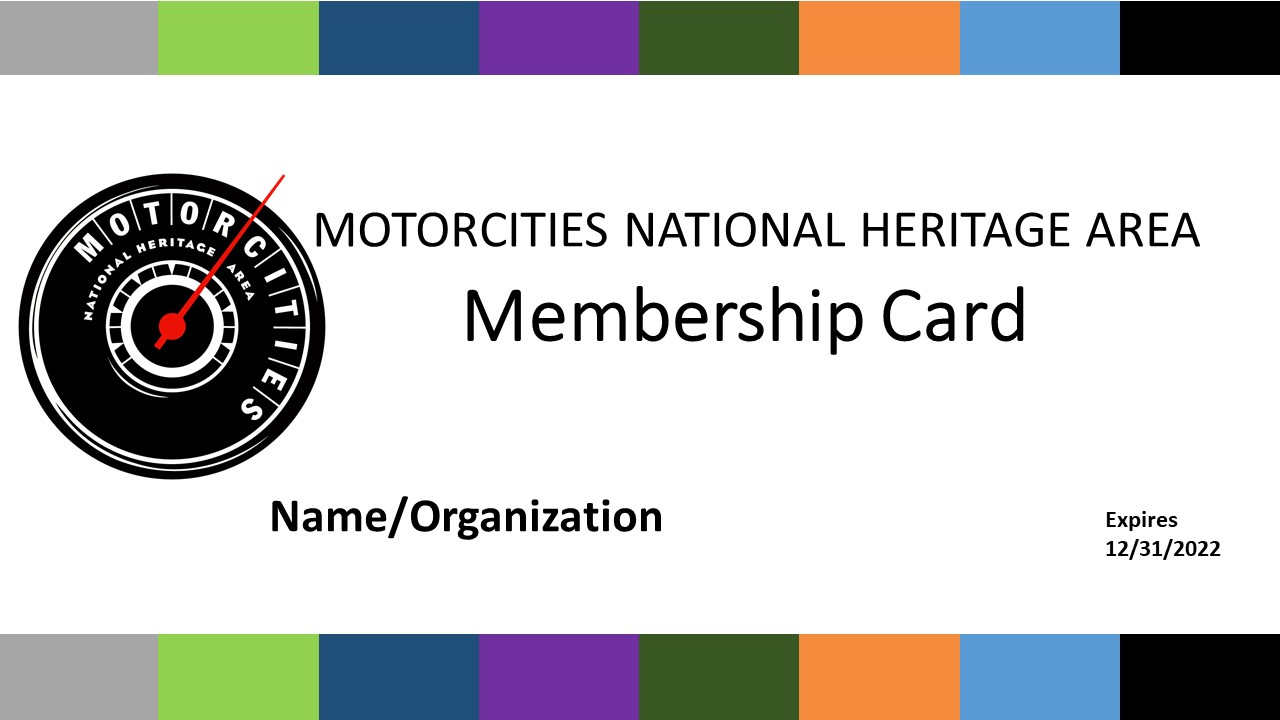
4. Recognition on the MotorCities website
The Internal Revenue Service recognizes MotorCities National Heritage Area Partnership, Inc. as a Section 501(c)(3) public charity. Gifts are tax deductible in the U.S.A. Our Federal Tax ID # is 38-3489636
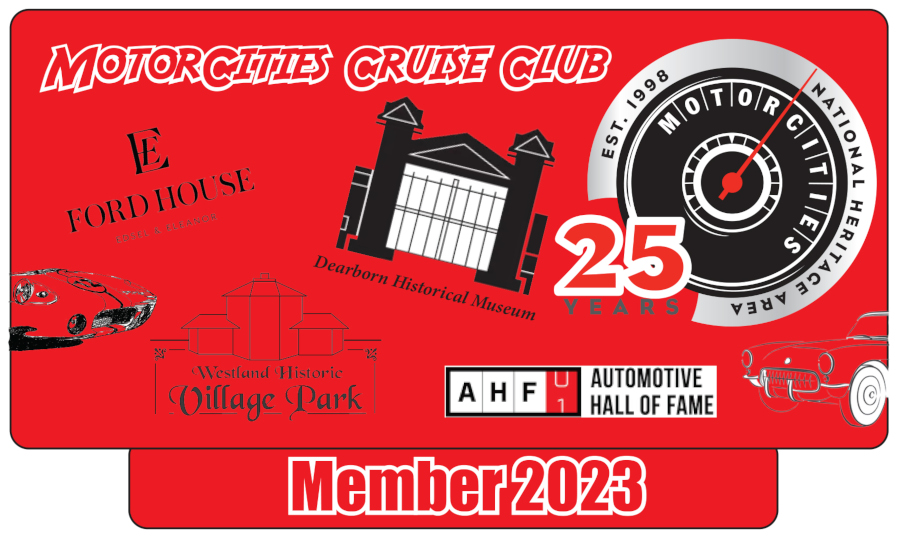
The second year of our MotorCities Cruise Club has wrapped up! Stay tuned to see what we have planned for 2024.
Join our board members Don Nicholson of Westland and Michael Bauman for our monthly Cruise Nights hosted at MotorCities’ partner attractions.
Each of these events is open to all cruisers, but membership has its privileges!
CLICK THE UNDERLINED LINKS TO BECOME A MEMBER OF MOTORCITIES AND THE CRUISE CLUB! (Only MotorCities members can join the Cruise Club)*
CURRENT MOTORCITIES MEMBERS -- You can join our exclusive MotorCities Cruise Club for just an additional $10/year by clicking here.
Cruise Club benefits include the following:
2023 MotorCities Cruise Club Sponsors:
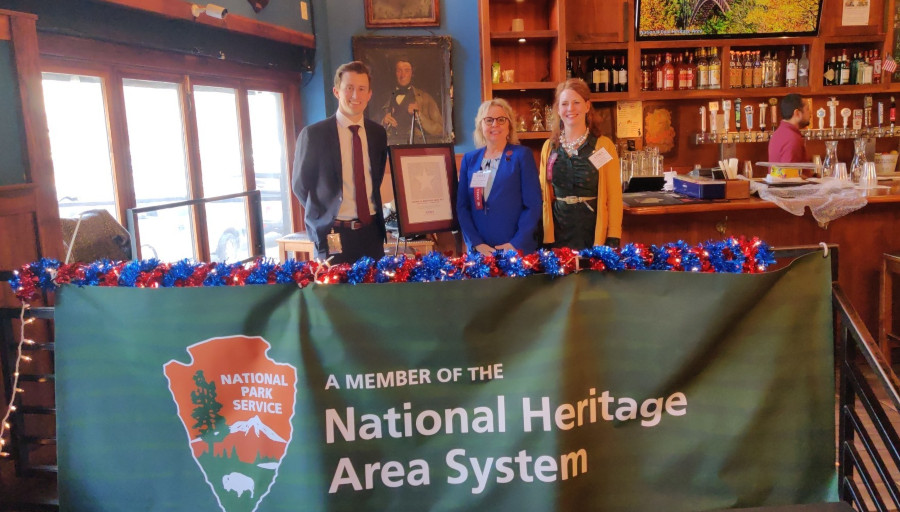
From Left to Right: Christian Graf of Senator Debbie Stabenow's office, MotorCities Executive Director Shawn Pomaville-Size, and Sara Capen, Chair of the Alliance of National Heritage Areas (ANHA) celebrate the passage of the National Heritage Act in Washington D.C. in February 2023.
On January 5, 2023, President Biden signed the National Heritage Area Act (S.1942) into law. This action followed the December 22, 2022 passage of the legislation by the U.S. House of Representatives by a bi-partisan vote of 326-95, after the Senate passed the bill by unanimous consent two days earlier. It was one of the last bills passed in the 117th Congress.
The National Heritage Area Act was championed by Senators Debbie Stabenow (D-MI) and Roy Blunt (R-MO) in the Senate and Representatives Paul Tonko (D-NY) and David McKinley (R-WV) in the House. The bipartisan bills were co-sponsored by 16 Senators and 138 House members (through the House companion bill, H.R. 1316).
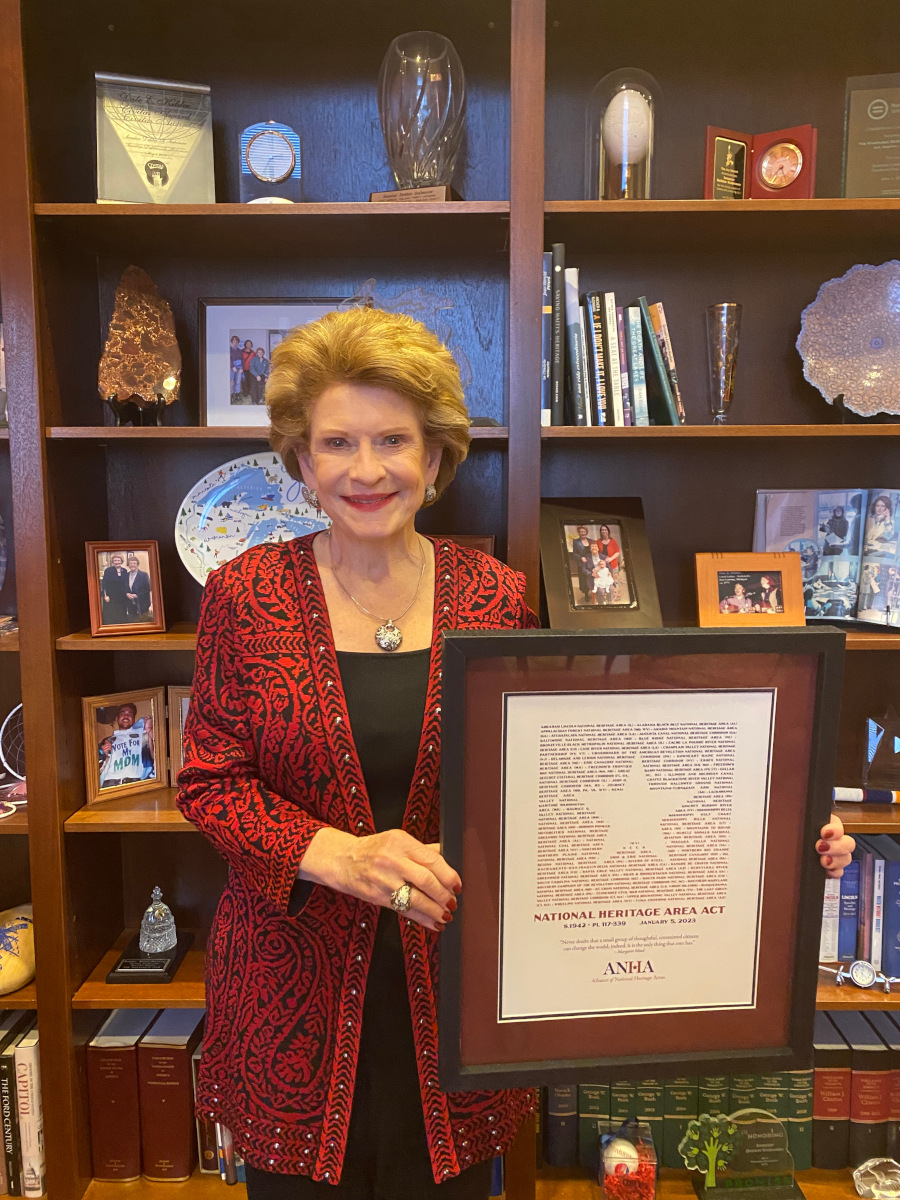
The National Heritage Area Act creates a system through which the Department of Interior may furnish financial and technical assistance to National Heritage Areas. It sets forth standard criteria for the funding, management, and designation of National Heritage Areas across the country, including the MotorCities National Heritage Area here in Michigan, and provides them an annual authorization of up to $1 million per year for the next 15 years. S. 1942 solves a challenge that as many as 45 existing NHAs would have experienced in the next two years, when their authorizations were scheduled to sunset. S. 1942 also authorizes seven new National Heritage Areas.
“National Heritage Areas not only commemorate our nation’s history, but also create jobs and boost tourism for communities across the country,” said Senator Stabenow. “This law ensures that Michigan’s own MotorCities National Heritage Area can continue to preserve and share our rich automotive history for years to come.”
“Our National Heritage Area was slated to sunset on September 30, 2023,” said Shawn Pomaville-Size, executive director of MotorCities National Heritage Area, based in Detroit. “This legislation couldn’t be more timely to provide the stability that comes from knowing we have authorization until 2037.”
President Ronald Reagan established National Heritage Areas in 1984 when he signed a bill that created the Illinois and Michigan Canal National Heritage Area. Since then, 54 additional NHAs have been created across the United States, all through community-led efforts. Rather than an enclosed park as is typical of other programs administered by the National Park Service (NPS), NHAs are lived-in spaces that often span large geographic areas that cross multiple jurisdictions, including a total of 591 counties in 34 states.
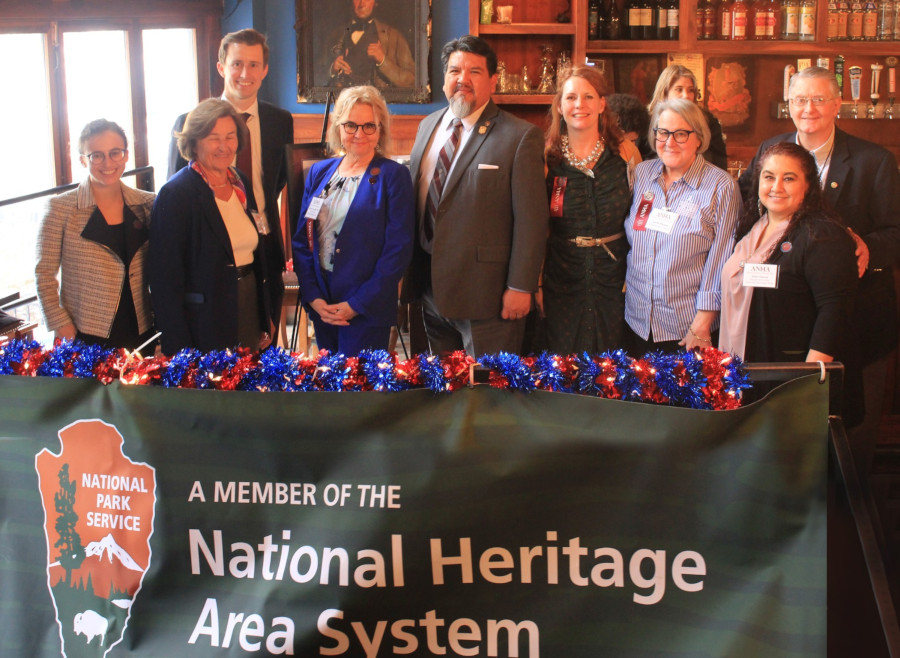 National Park Service Director Chuck Sams (center) celebrates the passage of the National Heritage Area in Washington D.C. in February 2023. From left to right: Miranda Miller of Representative Paul Tonko's Office; Annie Harris, Essex National Heritage Area; Christian Graf of Senator Debbie Stabenow's Office; MotorCities Executive Director Shawn Pomaville-Size; Sams; Sara Capen, Niagara Falls National Heritage Area; Sarah Watson, Abraham Lincoln National Heritage Area; Julie Chacon, Sangre de Cristo National Heritage Area; and Doug Harmon of the Alliance of National Heritage Areas (ANHA).
National Park Service Director Chuck Sams (center) celebrates the passage of the National Heritage Area in Washington D.C. in February 2023. From left to right: Miranda Miller of Representative Paul Tonko's Office; Annie Harris, Essex National Heritage Area; Christian Graf of Senator Debbie Stabenow's Office; MotorCities Executive Director Shawn Pomaville-Size; Sams; Sara Capen, Niagara Falls National Heritage Area; Sarah Watson, Abraham Lincoln National Heritage Area; Julie Chacon, Sangre de Cristo National Heritage Area; and Doug Harmon of the Alliance of National Heritage Areas (ANHA).
MotorCities, which celebrates its 25th anniversary in 2023, is a nonprofit corporation affiliated with the NPS that serves 16 Michigan counties representing a population of over 6.5 million. Its mission is to preserve, interpret and promote the region’s rich automotive and labor heritage. Regional programs inspire residents and visitors with an appreciation for how the automobile changed Michigan, the nation, and the world.
In addition, MotorCities also generates $489.7 million each year in economic impact, supporting 5,343 jobs and producing $40 million in tax revenue in Michigan. Over its history, MotorCities has awarded more than 300 grants for a total investment in local programs of more than $1.6 million.
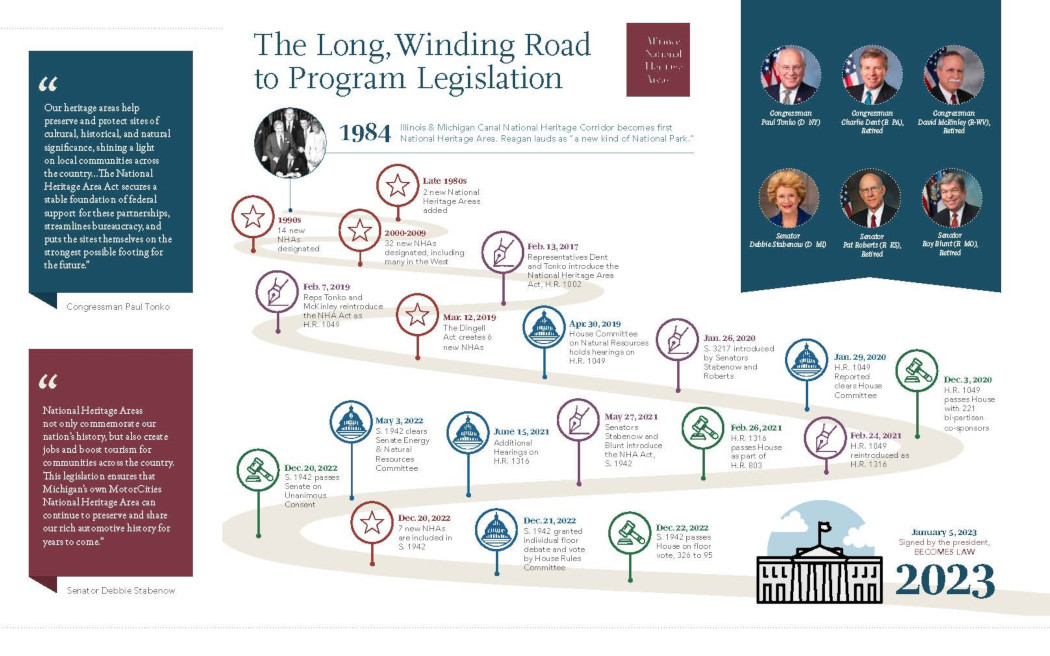
"The Alliance of National Heritage Areas has been working on this legislative effort for over ten years," Pomaville-Size added. "To say the passage of this bill is a major achievement is an understatement, and we are especially thankful to both Senator Stabenow and Congresswoman Debbie Dingell on the House side for introducing legislation and remaining steadfast until their efforts became a reality."
“The passing of this bill means everything to the MotorCities staff and board of directors,” said Mark Heppner, CEO of Ford House in Grosse Pointe Shores and Chair of the MotorCities board. “It allows us to focus on the mission and the good work of the organization and not worry about whether we will be around in 5-10 years. This commitment permits us to focus on the future, not the present. I am personally grateful for the signing of this bill into law and for the support of our elected officials, who have clearly demonstrated they value our collective automotive and labor heritage and that it matters.”
